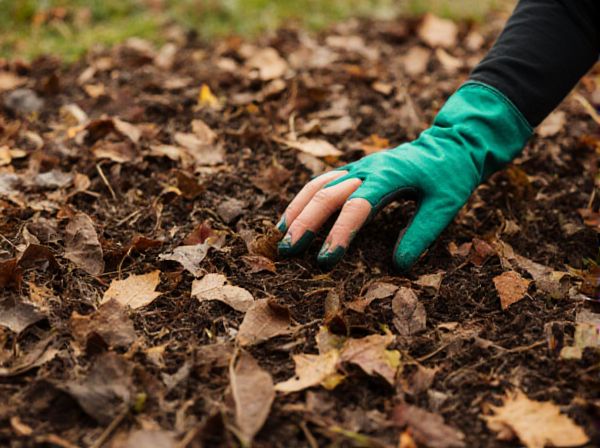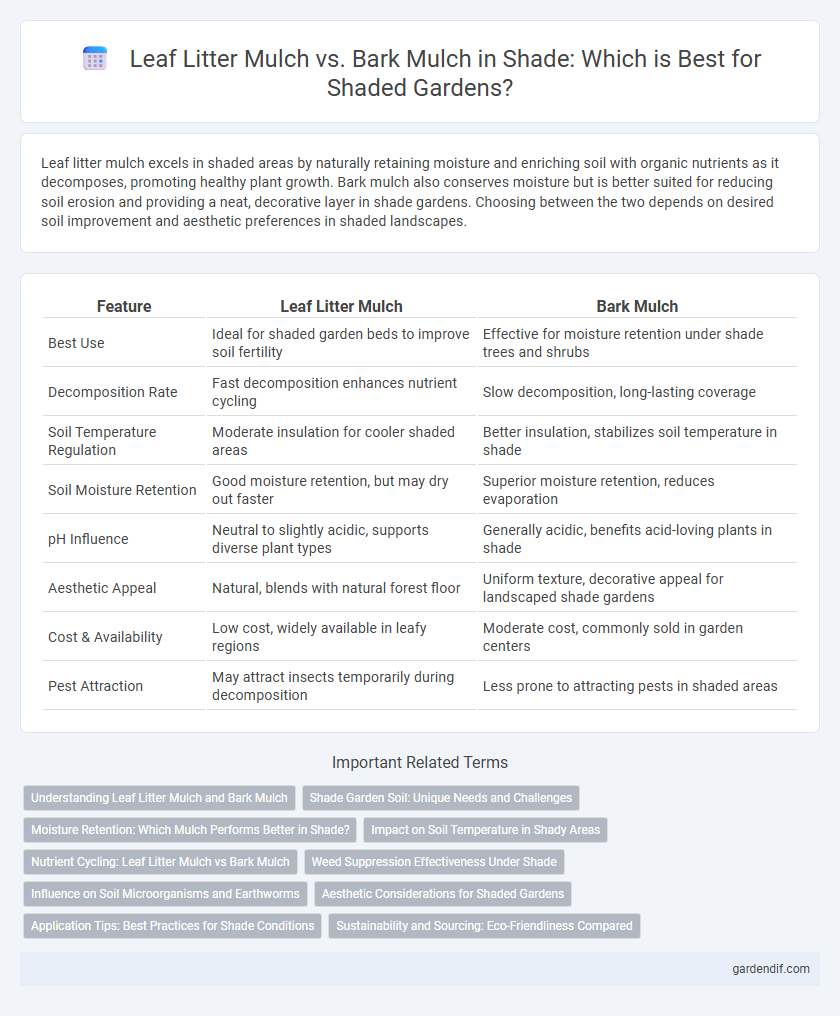
Leaf litter mulch vs bark mulch in shade Illustration
Leaf litter mulch excels in shaded areas by naturally retaining moisture and enriching soil with organic nutrients as it decomposes, promoting healthy plant growth. Bark mulch also conserves moisture but is better suited for reducing soil erosion and providing a neat, decorative layer in shade gardens. Choosing between the two depends on desired soil improvement and aesthetic preferences in shaded landscapes.
Table of Comparison
| Feature | Leaf Litter Mulch | Bark Mulch |
|---|---|---|
| Best Use | Ideal for shaded garden beds to improve soil fertility | Effective for moisture retention under shade trees and shrubs |
| Decomposition Rate | Fast decomposition enhances nutrient cycling | Slow decomposition, long-lasting coverage |
| Soil Temperature Regulation | Moderate insulation for cooler shaded areas | Better insulation, stabilizes soil temperature in shade |
| Soil Moisture Retention | Good moisture retention, but may dry out faster | Superior moisture retention, reduces evaporation |
| pH Influence | Neutral to slightly acidic, supports diverse plant types | Generally acidic, benefits acid-loving plants in shade |
| Aesthetic Appeal | Natural, blends with natural forest floor | Uniform texture, decorative appeal for landscaped shade gardens |
| Cost & Availability | Low cost, widely available in leafy regions | Moderate cost, commonly sold in garden centers |
| Pest Attraction | May attract insects temporarily during decomposition | Less prone to attracting pests in shaded areas |
Understanding Leaf Litter Mulch and Bark Mulch
Leaf litter mulch in shaded areas enhances soil moisture retention and nutrient availability by decomposing naturally, enriching the soil with organic matter and supporting beneficial microbial activity. Bark mulch provides excellent weed suppression and long-lasting coverage but decomposes more slowly, offering less immediate nutrient release compared to leaf litter mulch. Choosing between leaf litter and bark mulch under shade depends on the desired balance of soil enrichment and maintenance frequency.
Shade Garden Soil: Unique Needs and Challenges
Leaf litter mulch provides organic matter that improves moisture retention and soil aeration in shade garden soil, which often faces limited sunlight and slower decomposition rates. Bark mulch, while longer-lasting and effective at suppressing weeds, may not enrich the soil as quickly in shaded conditions due to its slower breakdown. Selecting leaf litter mulch supports the unique microbiome and nutrient cycling essential for healthy plant growth in shaded environments.
Moisture Retention: Which Mulch Performs Better in Shade?
Leaf litter mulch outperforms bark mulch in moisture retention under shade due to its finer texture and rapid decomposition, which helps retain soil moisture and release nutrients. Bark mulch, being coarser, provides less consistent moisture retention and can sometimes cause uneven soil drying in shaded areas. For shaded gardens, leaf litter mulch creates a more effective moisture-retentive environment that supports healthy plant growth.
Impact on Soil Temperature in Shady Areas
Leaf litter mulch in shady areas helps maintain cooler soil temperatures by insulating the soil and reducing heat absorption during warmer months, promoting moisture retention and root health. Bark mulch, while also providing insulation, tends to retain more heat due to its denser composition, which can slightly elevate soil temperatures even in shaded environments. Choosing leaf litter mulch can be more effective for preventing soil overheating under shade, benefiting temperature-sensitive plant roots.
Nutrient Cycling: Leaf Litter Mulch vs Bark Mulch
Leaf litter mulch enhances nutrient cycling in shaded areas by decomposing faster and releasing essential nutrients such as nitrogen and potassium back into the soil. In contrast, bark mulch decomposes slowly, providing longer-lasting weed suppression but contributing fewer immediate nutrients to the soil. This difference affects soil fertility and plant health, with leaf litter mulch promoting a more active and dynamic nutrient exchange in shaded garden environments.
Weed Suppression Effectiveness Under Shade
Leaf litter mulch provides superior weed suppression under shade due to its dense layering and ability to retain moisture, which inhibits weed seed germination more effectively than bark mulch. Bark mulch, while longer-lasting, tends to be less compact, allowing more light to penetrate and potentially enabling weed growth. Studies reveal that leaf litter mulch can reduce weed emergence by up to 40% compared to bark mulch in shaded garden environments.
Influence on Soil Microorganisms and Earthworms
Leaf litter mulch enhances soil microorganism diversity and activity more effectively than bark mulch in shaded areas, promoting nutrient cycling and organic matter decomposition. Earthworm populations tend to thrive better under leaf litter due to its softer texture and higher moisture retention, which creates a favorable habitat. Bark mulch, while providing longer-lasting coverage, often supports fewer earthworms and less microbial biomass, potentially limiting soil ecosystem health in shade environments.
Aesthetic Considerations for Shaded Gardens
Leaf litter mulch offers a natural, organic appearance that blends seamlessly with shaded garden environments, promoting a woodland aesthetic. Bark mulch provides a more uniform texture and richer, darker color that enhances contrast and highlights plant foliage in low-light conditions. Choosing between leaf litter and bark mulch depends on desired visual effects, with leaf litter emphasizing rustic charm and bark mulch delivering polished, structured appeal.
Application Tips: Best Practices for Shade Conditions
Leaf litter mulch retains moisture effectively and decomposes quickly, enriching soil nutrients in shaded areas, while bark mulch offers longer-lasting coverage and better weed suppression under low-light conditions. Apply leaf litter mulch in a thin, even layer to prevent matting and allow air circulation, whereas bark mulch should be applied slightly thicker to maximize its insulating properties. Regularly monitor moisture levels and replenish mulch annually to optimize growth and protect root systems in shade-dominated landscapes.
Sustainability and Sourcing: Eco-Friendliness Compared
Leaf litter mulch excels in sustainability by naturally decomposing, enriching soil health, and minimizing waste through local sourcing from fallen leaves. Bark mulch, though longer-lasting and effective at moisture retention, often involves harvesting from trees, raising concerns about deforestation and carbon footprint. Opting for leaf litter mulch supports eco-friendly gardening practices by recycling organic matter without additional environmental strain.
Leaf litter mulch vs bark mulch in shade Infographic

 gardendif.com
gardendif.com